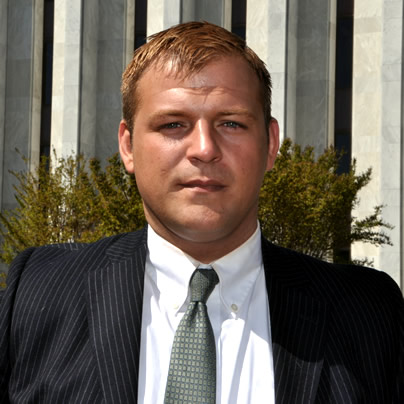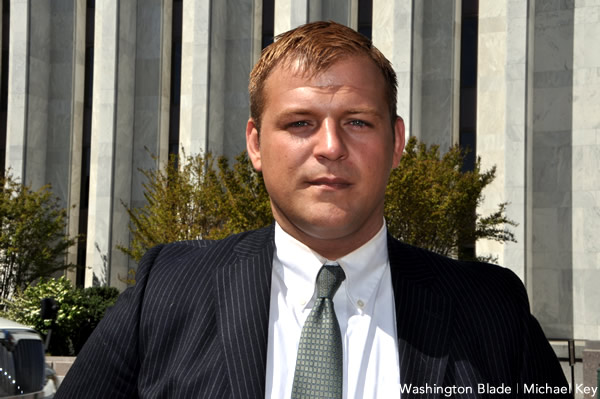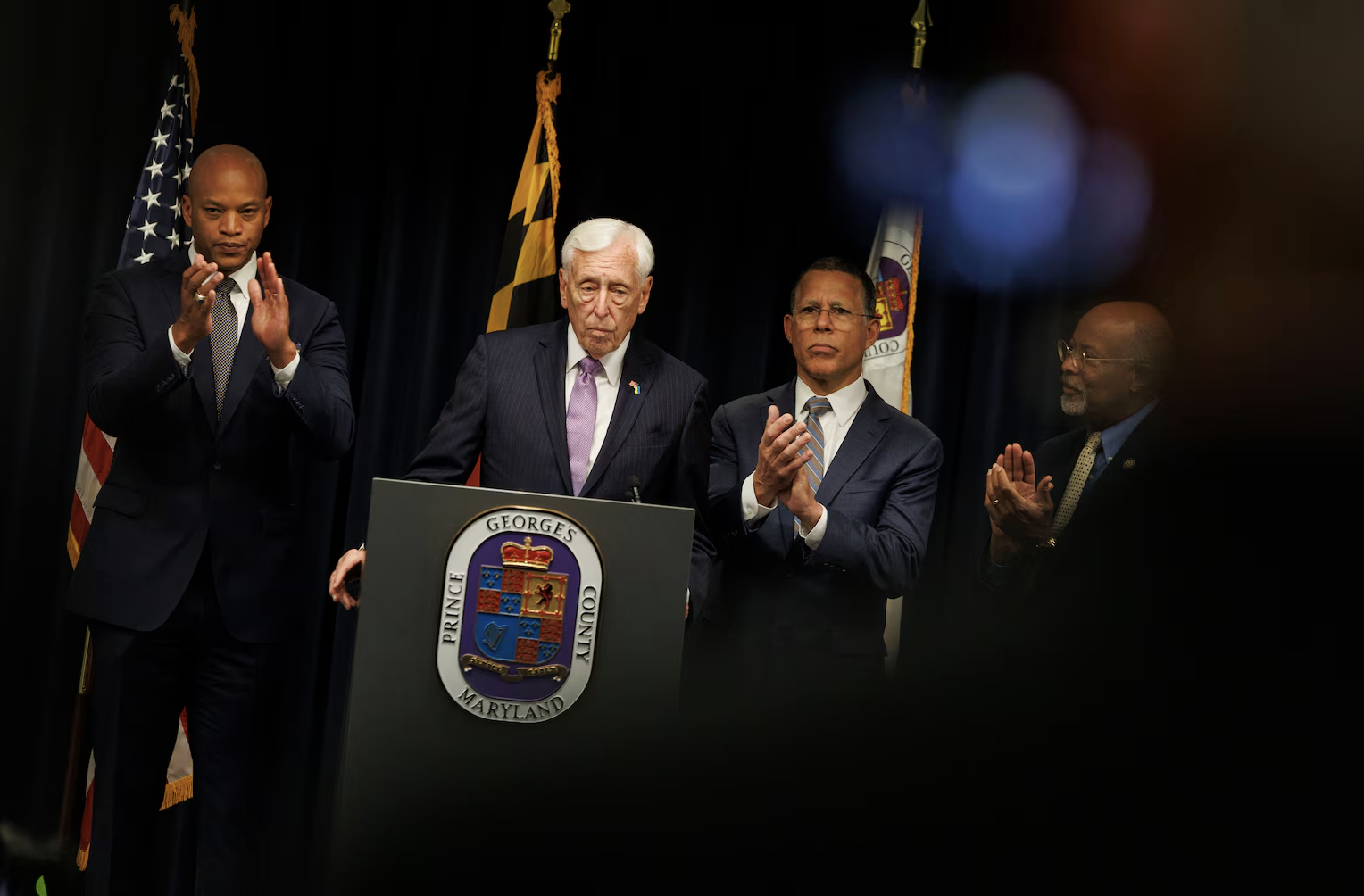Local
Library of Congress staffer fired, claims anti-gay bias
Says he was outed on Facebook, ‘stalked’ by superior at D.C. gay bar


Peter TerVeer, 30, was fired last week from his job at the Library of Congress and claims his former boss cited biblical passages condemning homosexuality.
A gay man has charged in a discrimination complaint that he was fired last week from his job at the Library of Congress after being harassed and humiliated for more than a year by a supervisor who repeatedly cited passages from the Bible condemning homosexuality.
Peter TerVeer, 30, a management analyst at the Library of Congress’s Office of the Inspector General since 2008, says in his complaint that supervisor John R. Mech created a hostile work environment for him to such a degree that he suffered severe stress, forcing him to take disability leave last fall and earlier this year.
“I contend that I have been subjected to a hostile work environment by Mr. Mech since August 2009 on the basis of my sex (male), sexual orientation (homosexual), and religion (non-denominational Christian/Agnostic),” TerVeer states in an affidavit accompanying his complaint.
“I maintain that Mr. Mech has acted to impose his religious beliefs on me,” TerVeer says in the affidavit.
TerVeer’s attorney, Thomas Simeone, said he will likely file a discrimination related lawsuit against the library on TerVeer’s behalf regardless of how the federal Equal Employment Opportunity Commission (EEOC), which is deliberating over the complaint, rules on the matter.
Gayle Osterberg, director of communications for the Library of Congress, said TerVeer’s complaint is considered a personnel matter and the library never comments on personnel-related issues pertaining to an individual employee.
She said that under library rules, neither John Mech, an accountant and lead auditor for the library’s Office of The Inspector General, nor any other library employee familiar with TerVeer’s case would be permitted to comment on the case.
Simeone said a key factor in the case is that library officials promoted TerVeer three times and praised his work and that negative job performance reviews suddenly began after Mech learned TerVeer was gay.
Asked about a policy adopted by the Library of Congress in the 1990s prohibiting employment discrimination based on sexual orientation, Osterberg declined to confirm whether such a policy is still in effect.
“We adhere to Title 7, period,” she said, referring to a provision in existing U.S. civil rights law that bans job discrimination based on race, religion, national origin, sex and other criteria but not on sexual orientation.
An internal “Librarian’s Policy Statement Regarding Non-Discrimination” issued to Library of Congress Employees on May 6, 2010, reiterates the 1990s-era statement pertaining to sexual orientation discrimination.
“Discrimination on the basis of race, color, religion, sex (including sexual harassment), national origin, age, disability, sexual orientation, gender identity, and/or political affiliation will not be tolerated,” the statement says.
Osterberg declined to disclose whether that and previous sexual orientation non-discrimination statements were still in effect.
TerVeer’s complaint, filed with the EEOC, follows a September 2008 federal court decision finding that the Library of Congress violated federal law against sex discrimination by denying a job to a transgender woman.
In that case, the library had determined that the applicant was qualified and hired her shortly before she announced she was transitioning from male to female. When officials learned that David Schroer was transitioning to Diane Schroer they rescinded the job offer and refused to hire Schroer.
A U.S. District Court judge ruled in September 2008 that the library’s refusal to hire Schroer violated a federal law prohibiting sex discrimination, a development hailed by the ACLU as an important breakthrough for transgender rights. The library decided against appealing the case and agreed to an out-of-court settlement with Diane Schroer in which it paid her compensatory damages.
Library of Congress: ‘AWOL’ for 37 days?
In a March 29, 2012 letter to TerVeer, Karl W. Schornagel, the library’s Inspector General and head of the division where TerVeer worked, said he approved TerVeer’s firing on grounds that TerVeer had been absent from work without approved leave or “AWOL” since Jan. 4, 2012.
Schornagel states in the letter that under library personnel rules, absence without approved leave is considered a form of misconduct that could lead to disciplinary action, including dismissal.
“I considered that you failed to report for duty as scheduled for over 37 consecutive workdays and failed to properly request approved leave despite being reminded of the proper procedures for requesting approved leave and advised of the consequences of your failure to report for duty as scheduled,” Schornagel said in his letter.
TerVeer told the Blade that library officials approved disability leave he had requested in October 2011 at the urging of his therapist and doctor based on the therapist’s determination that a hostile work environment at the library caused him to suffer severe mental stress.
According to TerVeer, the unpaid disability leave approved by the library expired in January 2012. He said library officials declined his request for a transfer to another office and demanded he return to duty with Mech remaining as his supervisor.
Simeone, TerVeer’s attorney, said library rules may have allowed TerVeer to apply for an extended disability leave. But he said TerVeer by that time had exhausted his financial resources following three months of unpaid leave and couldn’t afford to pay doctors and his therapist for the necessary examination and documentation needed to apply for extended disability leave.
“He was in a bind,” said Simeone. “He loved working there and he wanted to continue. And as you can tell, he needed the money. He tried to get a transfer to a new setting or a new area, but it was just not possible. They wouldn’t do that.”
Simeone said going back to the office where TerVeer knew he would be subjected to the same harassment and stress wasn’t an option he could accept.
Outed by boss’s daughter
TerVeer told the Blade he never intended to come out as gay at work when he first started his job at the library in February 2008. He said he had recently moved to D.C. from rural Western Michigan, which he said was devastated by the economic recession.
With a bachelor’s degree in business management from Hope College in Michigan and his enrollment at the University of Maryland for a degree in accounting and auditing, TerVeer said the start of his employment at the library’s Office of The Inspector General appeared to be a perfect fit for his chosen career path.
“The first year and a half, almost two years I was there I was closeted and essentially I was kind of the golden boy in the office,” he said. “He took me under his wing and we had a cordial discourse,” he said of Mech. “And he appeared to come off initially as really nice.”
TerVeer said the cordial relationship was based, in part, on their shared interest in sports and TerVeer’s role as captain of a school football team in Michigan. At one point Mech invited him to join his wife and son at a University of Maryland football game, TerVeer said.
As TerVeer tells it, his problems started just after that, when Mech invited him to “look up his daughter” in the late summer or early fall of 2009. Within days, said TerVeer, Mech’s daughter Katie contacted him on Facebook and asked to become Facebook friends.
He said he accepted her request after using the appropriate Facebook privacy controls to hide information on his own Facebook page that identified him as gay. But a short time later, Facebook put in place changes in its settings in such a way that TerVeer’s link to a Facebook group in support of gay adoptions became publicly visible, TerVeer said.
“I get home one day and she saw it and commented and she said, ‘You’re not one of those weirdoes are you?’ I said I am actually, in fact, one of those weird ones if you’re referring to the fact that I’m gay.”
TerVeer said Katie Mech initially said she wasn’t troubled by this discovery, saying she had a good friend in San Francisco who’s gay.
However, the following day TerVeer said he discovered that she had both “de-friended” and blocked him from her Facebook page. Within days of that, John Mech began raising his religious beliefs with TerVeer in emails and in face-to-face conversations with him, TerVeer said.
“All of a sudden now, every time I’m going into his office he’s starting off with a religious conversation. Then it comes out where he pointed out he was a believer with a literal translation of the Bible,” said TerVeer. “Then he goes specifically into homosexuality.”
TerVeer said he knew then that Katie Mech informed her father that he is gay.
In his affidavit, TerVeer said things came to a head on June 21, 2010.
“He came into my office on that date and said he wanted to educate me on hell and that it was a sin to be a homosexual,” TerVeer says in the affidavit. “He said he hoped I repented because the Bible was very clear about what God does to homosexuals.”
Among other things, TerVeer says in the affidavit that Mech quoted the Old Testament passage of Leviticus, stating, “If a man lies with a man as one lies with a woman, both of them have done what is detestable. They must be put to death; their blood will be on their heads.”
TerVeer says in the affidavit, “He stated that as a homosexual I could never succeed because it was against God’s law.”
Four days later, on June 25, 2010, Mech spoke with TerVeer about TerVeer’s annual performance review and TerVeer expressed concern that his ratings were lower than he believed they should be, he says in the affidavit.
According to the affidavit, he politely told Mech he was concerned that the lower performance review might be biased because of Mech’s strongly expressed religious beliefs toward homosexuality.
“Mr. Mech became extremely upset and vehemently denied that my homosexuality and his personal views had an impact on his rating of me,” TerVeer says in the affidavit. “He accused me of attempting to injure his career and reputation and to ‘bring down the Library.’”
Gay official ‘stalks’ TerVeer
TerVeer says in his affidavit that beginning in July 2010 through the middle of 2011 Mech appeared to be “piling on” work assignments in an effort to set him up to fail. He said one particular project he was assigned to handle by himself had been previously worked on by six full-time employees and took more than a year to complete, yet he was told to complete it during a shorter period of time.
“I believe that Mr. Mech gave me this assignment to set me up for failure and to give him a better opportunity to identify and manufacture deficiencies in my performance,” TerVeer says in the affidavit. “I believe he decided in advance to give me negative ratings in my next performance review and began to create a record of alleged ‘job deficiencies’ to support this.”
In an effort to appeal what he believed to be an unfairly negative job performance rating calling for denying him a normally routine “step” pay increase, TerVeer said he approached Mech’s supervisor, Nicholas Christopher, the assistant inspector general for audits. “Mr. Christopher declined to change my performance evaluation and denied me a WIGI [Within Grade Increase]” in pay, he says in the affidavit.
When he indicated he was in the process of filing a possible discrimination complaint, TerVeer said that both Mech and Christopher appeared to warn him against doing so, saying he could face consequences such as additional poor performance ratings.
In a staff meeting on June 28, 2011, TerVeer says in the affidavit that Mech demanded that he explain, “what I was doing” concerning his stated intention to appeal the low job performance rating.
“He berated and humiliated me in front of my co-workers,” TerVeer says in the affidavit. “He interrogated me regarding the exact nature of my appeal and who I was filing the action against.”
After beginning his disability leave in the fall of 2011, TerVeer said he was startled when Christopher appeared at the D.C. gay bar Number Nine, where TerVeer had been working as a security staffer, and began to take a video of him with his cell phone.
TerVeer and his lawyer at the time, Brennan McCarthy, said TerVeer’s therapist believed working a job at a gay bar provided a friendly, supportive work environment and was an important part of his recovery from the stress-related ailment that required he take a leave from his job at the library.
In a Feb. 16, 2012 letter to Vicki Magnus, acting deputy director of the library’s Office of Opportunity, Inclusiveness and Compliance, which investigates discrimination complaints, McCarthy expressed concern that Christopher had “commenced a pattern of harassment, including stalking Mr. TerVeer at his second job and videotaping Mr. TerVeer while working.”
McCarthy said Christopher appeared to have begun harassing TerVeer after Christopher learned that TerVeer was considering filing a discrimination complaint.
“Following that revelation, Mr. Christopher took all steps possible not only to keep Mr. TerVeer from filing his complaint with your office, but also stated that poor performance reviews are ‘what happens’ when someone tried to bring down the Library of Congress (i.e., files an EEOC complaint),” McCarthy said in his letter.
Sources familiar with the Library of Congress have told the Blade that it’s widely known at the library that Christopher is gay. Christopher states in the publicly accessible part of his Facebook page that his “relationship status” is “single” and he’s “interested in” men.
He also describes his religious views on his Facebook page as being “vociferously atheist.”
Christopher didn’t respond to a Blade message asking whether he was troubled over TerVeer’s allegation that Mech had been reciting biblical passages to TerVeer at work condemning his homosexuality.
Virginia
Gay Va. State Sen. Ebbin resigns for role in Spanberger administration
Veteran lawmaker will step down in February

Alexandria Democrat Adam Ebbin, who has served as an openly gay member of the Virginia Legislature since 2004, announced on Jan. 7 that he is resigning from his seat in the State Senate to take a job in the administration of Gov.-Elect Abigail Spanberger.
Since 2012, Ebbin has been a member of the Virginia Senate for the 39th District representing parts of Alexandria, Arlington, and Fairfax counties. He served in the Virginia House of Delegates representing Alexandria from 2004 to 2012, becoming the state’s first out gay lawmaker.
His announcement says he submitted his resignation from his Senate position effective Feb. 18 to join the Spanberger administration as a senior adviser at the Virginia Cannabis Control Authority.
“I’m grateful to have the benefit of Senator Ebbin’s policy expertise continuing to serve the people of Virginia, and I look forward to working with him to prioritize public safety and public health,” Spanberger said in Ebbin’s announcement statement.
She was referring to the lead role Ebbin has played in the Virginia Legislature’s approval in 2020 of legislation decriminalizing marijuana and the subsequent approval in 2021of a bill legalizing recreational use and possession of marijuana for adults 21 years of age and older. But the Virginia Legislature has yet to pass legislation facilitating the retail sale of marijuana for recreational use and limits sales to purchases at licensed medical marijuana dispensaries.
“I share Governor-elect Spanberger’s goal that adults 21 and over who choose to use cannabis, and those who use it for medical treatment, have access to a well-tested, accurately labeled product, free from contamination,” Ebbin said in his statement. “2026 is the year we will move cannabis sales off the street corner and behind the age-verified counter,” he said.
Maryland
Steny Hoyer, the longest-serving House Democrat, to retire from Congress
Md. congressman served for years in party leadership

By ASSOCIATED PRESS and LISA MASCARO | Rep. Steny Hoyer of Maryland, the longest-serving Democrat in Congress and once a rival to become House speaker, will announce Thursday he is set to retire at the end of his term.
Hoyer, who served for years in party leadership and helped steer Democrats through some of their most significant legislative victories, is set to deliver a House floor speech about his decision, according to a person familiar with the situation and granted anonymity to discuss it.
“Tune in,” Hoyer said on social media. He confirmed his retirement plans in an interview with the Washington Post.
The rest of this article can be found on the Baltimore Banner’s website.
District of Columbia
Kennedy Center renaming triggers backlash
Artists who cancel shows threatened; calls for funding boycott grow

Efforts to rename the Kennedy Center to add President Trump’s name to the D.C. arts institution continue to spark backlash.
A new petition from Qommittee , a national network of drag artists and allies led by survivors of hate crimes, calls on Kennedy Center donors to suspend funding to the center until “artistic independence is restored, and to redirect support to banned or censored artists.”
“While Trump won’t back down, the donors who contribute nearly $100 million annually to the Kennedy Center can afford to take a stand,” the petition reads. “Money talks. When donors fund censorship, they don’t just harm one institution – they tell marginalized communities their stories don’t deserve to be told.”
The petition can be found here.
Meanwhile, a decision by several prominent musicians and jazz performers to cancel their shows at the recently renamed Trump-Kennedy Center in D.C. planned for Christmas Eve and New Year’s Eve has drawn the ire of the Center’s president, Richard Grenell.
Grenell, a gay supporter of President Donald Trump who served as U.S. ambassador to Germany during Trump’s first term as president, was named Kennedy Center president last year by its board of directors that had been appointed by Trump.
Last month the board voted to change the official name of the center from the John F. Kennedy Memorial Center For The Performing Arts to the Donald J. Trump And The John F. Kennedy Memorial Center For The Performing Arts. The revised name has been installed on the outside wall of the center’s building but is not official because any name change would require congressional action.
According to a report by the New York Times, Grenell informed jazz musician Chuck Redd, who cancelled a 2025 Christmas Eve concert that he has hosted at the Kennedy Center for nearly 20 years in response to the name change, that Grenell planned to arrange for the center to file a lawsuit against him for the cancellation.
“Your decision to withdraw at the last moment — explicitly in response to the Center’s recent renaming, which honors President Trump’s extraordinary efforts to save this national treasure — is classic intolerance and very costly to a non-profit arts institution,” the Times quoted Grenell as saying in a letter to Redd.
“This is your official notice that we will seek $1 million in damages from you for this political stunt,” the Times quoted Grenell’s letter as saying.
A spokesperson for the Trump-Kennedy Center did not immediately respond to an inquiry from the Washington Blade asking if the center still planned to file that lawsuit and whether it planned to file suits against some of the other musicians who recently cancelled their performances following the name change.
In a follow-up story published on Dec. 29, the New York Times reported that a prominent jazz ensemble and a New York dance company had canceled performances scheduled to take place on New Year’s Eve at the Kennedy Center.
The Times reported the jazz ensemble called The Cookers did not give a reason for the cancellation in a statement it released, but its drummer, Billy Hart, told the Times the center’s name change “evidently” played a role in the decision to cancel the performance.
Grenell released a statement on Dec. 29 calling these and other performers who cancelled their shows “far left political activists” who he said had been booked by the Kennedy Center’s previous leadership.
“Boycotting the arts to show you support the arts is a form of derangement syndrome,” the Times quoted him as saying in his statement.
-

 National4 days ago
National4 days agoWhat to watch for in 2026: midterms, Supreme Court, and more
-

 District of Columbia5 days ago
District of Columbia5 days agoTwo pioneering gay journalists to speak at Thursday event
-

 a&e features5 days ago
a&e features5 days agoQueer highlights of the 2026 Critics Choice Awards: Aunt Gladys, that ‘Heated Rivalry’ shoutout and more
-

 Colombia4 days ago
Colombia4 days agoBlade travels to Colombia after U.S. forces seize Maduro in Venezuela


















